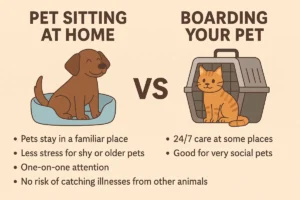
Just like us, pets are emotional beings—and they can feel sadness, boredom, and loneliness when their favorite humans aren’t around. Whether you’re at work all day, running errands, or away on a trip, your dog or cat may experience distress from being left alone. Learning to recognize the signs of a lonely pet is key to helping them feel safe, happy, and emotionally secure.
Behavior Changes to Watch For
Every pet is different, but there are common signs that may indicate your furry friend is struggling with loneliness or boredom. If you notice any of these changes, it could be time to consider extra support:
- Loss of Appetite or Increased Thirst: Skipping meals or drinking more (or less) than usual can be a sign of emotional distress.
- Sleeping More Than Normal: A sleepy pet might be bored or depressed, especially if they’re napping far more than usual.
- Destructive or Unusual Behavior: Barking, whining, chewing furniture, or scratching surfaces may be your pet’s way of expressing frustration or anxiety.
- Withdrawal or Clinginess: Some pets retreat and hide, while others become overly clingy when you return, desperate for connection.
These behavioral shifts may seem small at first, but over time they can signal deeper emotional needs.
Anxiety Cues That Shouldn’t Be Ignored
Loneliness often goes hand-in-hand with anxiety. If your pet is showing signs of stress while you’re away, they may be trying to cope with your absence in the only way they know how:
- Pacing or Restlessness: Repetitive movements like pacing or circling can be a nervous habit that stems from separation anxiety.
- Excessive Vocalization: Whining, howling, or barking for extended periods are emotional cries for attention and connection.
- Accidents Indoors: Even house-trained pets may urinate or defecate inside when feeling anxious or abandoned.
- Waiting by the Door or Window: If your pet spends hours staring out the window or sitting near the front door, they may be longing for your return.
Recognizing these pet anxiety cues is the first step in making changes that support your pet’s emotional wellbeing.
How Pet Sitting Helps
The good news? You don’t have to leave your pet to struggle alone. Hiring a professional pet sitter can make a huge difference in your pet’s daily life and mental health. At Furry Friends of AZ, we offer compassionate, reliable care to help ease loneliness and keep pets happy while you’re away.
Here’s how a sitter can help:
- Meaningful Companionship: We don’t just “check in”—we spend time bonding, snuggling, playing, and talking to your pet.
- Routine & Structure: Pets thrive on familiarity. We stick to your pet’s usual feeding, walking, and playtime routines to reduce stress.
- Mental & Physical Stimulation: Walks, playtime, and enrichment activities help distract your pet from loneliness and keep their minds engaged.
- Reassurance & Love: Sometimes, all a pet needs is a warm presence to remind them they’re not alone.
When your pet is in the care of Furry Friends of AZ, they’re not just being looked after—they’re being loved. Our experienced sitters know how to respond to emotional cues and help your pet feel calm and secure, even in your absence.


